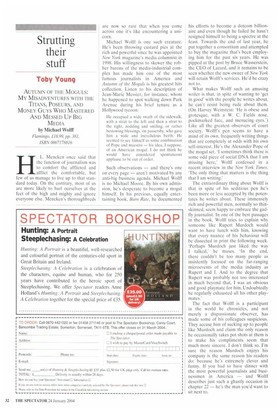Strutting their stuff
Toby Young
AUTUMN OF THE MOGULS: MY MISADVENTURES WITH THE TITANS, POSEURS, AND MONEY GUYS WHO MASTERED AND MESSED UP BIG MEDIA by Michael Wolff Flamingo, ,f18.99, pp. 381, ISBN 0007178816 H. L. Mencken once said that the function of journalism was to comfort the afflicted and afflict the comfortable, but few of us manage to live up to that standard today. On the contrary. most of us are more likely to hurl ourselves at the feet of the high and mighty and ignore everyone else. Mencken's thoroughbreds
are now so rare that when you come across one it's like encountering a unicorn.
Michael Wolff is one such creature. He's been throwing custard pies at the rich and powerful since he was appointed New York magazine's media columnist in 1998. His willingness to skewer the robber barons of the media-industrial complex has made him one of the most famous journalists in America and Autumn of the Moguls is his greatest hits collection. Listen to his description of Jean-Marie Messier, for instance, whom he happened to spot walking down Park Avenue during his brief tenure as a Hollywood tycoon:
He occupied a wide swath of the sidewalk, with a strut to the left and then a strut to the right, nodding and smiling, or rather bestowing blessings, on passersby, who gave him a wide and incredulous berth. He seemed to see himself as some combination of Pope and maestro — his idea, I suppose, of an American mogul. I do not think he would have considered spontaneous applause to be out of order.
Such observations — and there's one on every page — aren't motivated by any anti-big business agenda. Michael Wolff is no Michael Moore. By his own admission, he's desperate to become a mogul himself. In his previous, equally entertaining book, Burn Rate, he documented his efforts to become a dotcom billionaire and even though he failed he hasn't resigned himself to being a spectre at the feast. Towards the end of last year, he put together a consortium and attempted to buy the magazine that's been employing him for the past six years. He was pipped at the post by Bruce Wasserstein, the CEO of Lazard, and it remains to be seen whether the new owner of New York will retain Wolff's services. He'd be crazy not to.
What makes Wolff such an amusing writer is that, in spite of wanting to 'get in good' with the people he writes about, he can't resist being rude about them. (On Harvey Weinstein: 'He is obese and grotesque, with a W. C. Fields nose, pockmarked face, and menacing eyes.) Like all the greatest observers of court society, Wolff's pen seems to have a mind of its own, frequently writing things that are completely at odds with his own self-interest. He's the Alexander Pope of the mogul set. 'I sometimes think there is some odd piece of social DNA that I am missing here,' Wolff confessed in a recent interview in the New York Times. The only thing that matters is the thing that I am writing.'
The extraordinary thing about Wolff is that in spite of his seditious pen he's been more or less accepted by the potentates he writes about. These immensely rich and powerful men, normally so thinskinned, seem happy to embrace the gadfly journalist. In one of the best passages in the book, Wolff tries to explain why someone like Rupert Murdoch would want to have lunch with him, knowing that every nuance of his behaviour will be dissected in print the following week. 'Perhaps Murdoch just liked the way I talked,' he muses. 'In the end, there couldn't be too many people as insistently focused on the far-ranging microevents of the media industry as Rupert and I. And to the degree that Rupert was probably not too interested in much beyond that, I was an obvious and good playmate for him. Undoubtedly he regularly exhausted all his other playmates.'
The fact that Wolff is a participant in the world he chronicles, and not merely a dispassionate observer, has made some of his colleagues suspicious. They accuse him of sucking up to people like Murdoch and claim the only reason he occasionally takes pot shots at them is to make his compliments seem that much more sincere. I don't think so. I'm sure the reason Murdoch enjoys his company is the same reason his readers do: because he's extremely clever and funny. If you had to have dinner with the most powerful journalists and businessmen in America — and Wolff describes just such a ghastly occasion in chapter 22 — he's the man you'd want to sit next to.


























































 Previous page
Previous page